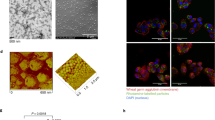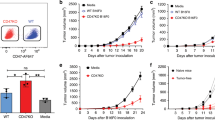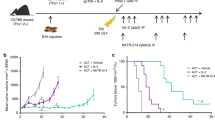Abstract
In the present study, TNF-α gene–transduced B78 melanoma cells (B78/TNF) were used as a vaccine and combined with interleukin (IL)-12 in the treatment of B78-melanoma-bearing mice. The combined administration of genetically modified melanoma cells and IL-12 induced specific protective antitumor immunity resulting in a decreased rate of the tumor take following a rechallenge with parental B78 cells. When used therapeutically, intratumoral injections of irradiated B78/TNF melanoma cells and IL-12 exerted strong antitumor effects and led to complete regression of established tumors in 50% of mice. Injections of irradiated B78/TNF cells alone did not influence tumor development and IL-12 itself significantly delayed tumor growth but without curative effect. FACS analysis of parental B78 melanoma cells and its B78/TNF genetically modified variant showed that a proportion of cells of both cell lines expressed B7-1 (CD80) costimulatory molecule and that the expression of this molecule was increased during incubation with IFN-γ. Moreover, IFN-γ markedly augmented expression of major histocompatibility class (MHC) class I and II molecules on B78/TNF cells that were primarily MHC class I and II negative with no substantial effect on MHC-negative parental B78 melanoma. IFN-γ also synergized in cytostatic/cytotoxic effects with TNF-α against B78 melanoma in vitro. Lymphocyte depletion studies in vivo showed reduction of the antitumor response in mice treated with anti-NK monoclonal antibodies (mAbs) as well as in mice treated with anti-CD4+anti-CD8 mAbs. The results suggest that, when used therapeutically, IL-12 and a vaccine containing TNF-α gene–transduced tumor cells may reciprocally augment their overall antitumor effectiveness by facilitating development of systemic antitumor immunity and by stimulating local effector mechanisms of the tumor destruction. Cancer Gene Therapy (2000) 7, 1581–1590.
This is a preview of subscription content, access via your institution
Access options
Subscribe to this journal
Receive 12 print issues and online access
$259.00 per year
only $21.58 per issue
Buy this article
- Purchase on Springer Link
- Instant access to full article PDF
Prices may be subject to local taxes which are calculated during checkout
Similar content being viewed by others
Author information
Authors and Affiliations
Corresponding author
Rights and permissions
About this article
Cite this article
Lasek, W., Mackiewicz, A., Czajka, A. et al. Antitumor effects of the combination therapy with TNF-α gene–modified tumor cells and interleukin 12 in a melanoma model in mice. Cancer Gene Ther 7, 1581–1590 (2000). https://doi.org/10.1038/sj.cgt.7700263
Received:
Accepted:
Published:
Issue Date:
DOI: https://doi.org/10.1038/sj.cgt.7700263
Keywords
This article is cited by
-
Immune enhancement and anti-tumour activity of IL-23
Cancer Immunology, Immunotherapy (2006)



